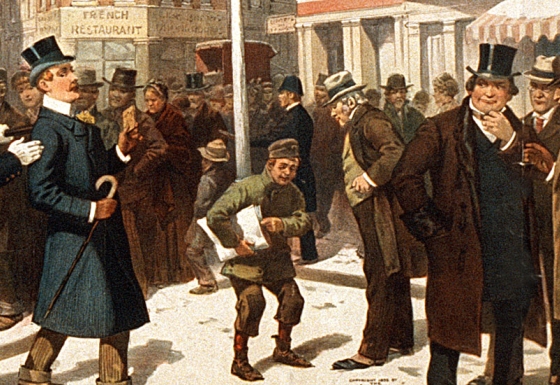During the nineteenth century, newspapers in America’s industrial centers played a vital role in capturing and shaping national and regional discussions about race, slavery, abolition, and the policies of Reconstruction. While these issues were also debated widely in the agrarian South and in the industrial Northeast, it was specifically in the Mid-Atlantic and Midwestern industrial states (IL, IN, NJ, NY, OH, PA, WI) where those exchanges were joined by two additional and divisive debates: Women’s Rights and Immigration. America’s Industrial Centers and the Politics of Race, Gender, and Immigration documents these real-time issues in a fully searchable digitized collection, offering research and teaching opportunities across an array of academic disciplines.
Daily News from America’s Industrial Centers
The rapid growth of industry during the 19th century in America’s mid-Atlantic and Midwestern states led to continued newspaper coverage and debates about economic ties to the South, slavery and abolition. Within these industrial centers, two other historical forces collided: immigration and industrialization. Newspapers in America’s manufacturing corridor reported widely and frequently on these shifting issues. A focus on the ensuing labor crisis led to women’s rights and immigration becoming leading topics of debate.
Fighting for equal pay for equal work, many of the early women’s rights organizations were formed in this region. Fascinatingly, it was in these states that the women's rights leaders allied themselves with the leaders of the abolitionist movement, and both groups jointly supported the creation of America's earliest labor unions.
The issue of immigrant rights was also controversial. The titles in this collection are filled with debates that pitted pro-immigrant free labor advocates against the anti-immigrant leaders of the American Party, known as the “Know Nothings.” Researchers of American labor movements, civil rights, legal history, industrial history, economics, and politics will therefore find this collection to be indispensable.
For scholars exploring the complex and contradictory undercurrents of nineteenth-century America, Series 20 includes some of the most influential and widely read papers in the Mid-Atlantic and Midwest, as well as a variety of local newspapers from across the region. And like all newspapers, the publications in America’s manufacturing corridor not only recorded the events of the time but played a leading role in shaping them. Researchers will encounter the stories behind the dramatic growth of immigration and industrialism – and the social, political, and economic debates these newspapers engendered.
Series 20 is designed to complement two other Readex collections: Early American Newspapers, Series 18, 1825-1878: Racial Awakening in the Northeast and Early American Newspapers, Series 19, 1766-1877: The Politics of Race in the South. Together, these three collections document the crucial and distinctive role of regional and local newspapers and their influence in the transformation of the nineteenth century and buildup to and aftermath of the American Civil War.
A curated collection of distinctive and influential newspapers
Like other series in the Early American Newspapers program, Series 20 offers significant titles listed in the authoritative bibliographies of early American newspapers by Clarence S. Brigham and Winifred Gregory. Sourced solely from the American Antiquarian Society, notable publications include the Daily Free Democrat (Milwaukee, WI), Anti-Slavery Bugle (Salem, OH), Newark Morning Eagle (Newark, NJ), Philadelphia Gazette and Daily Advertiser (Philadelphia, PA), The Sun (New York, NY), Indiana State Sentinel (Indianapolis, IN), Chicago Tribune (Chicago, IL), and hundreds more.





